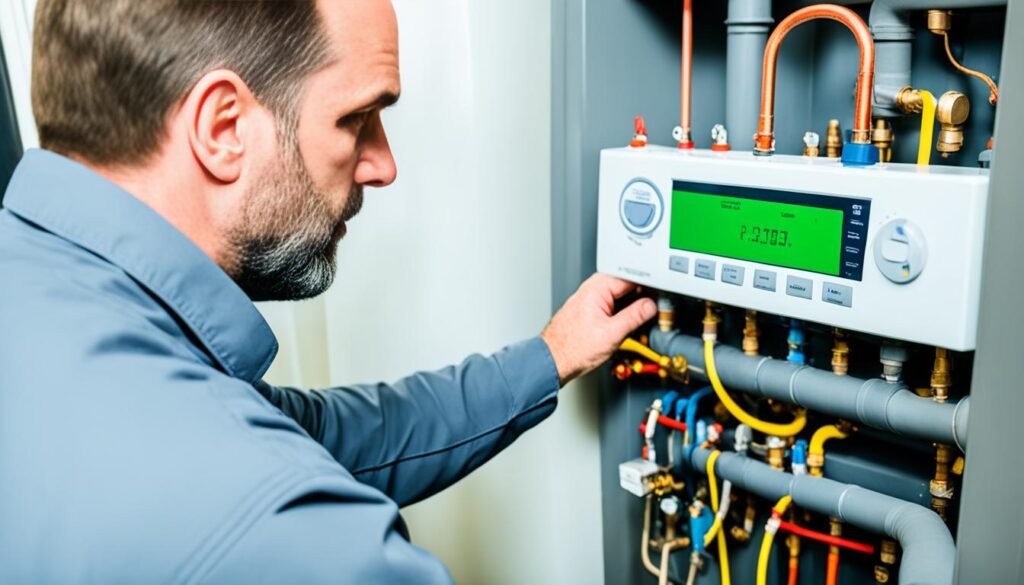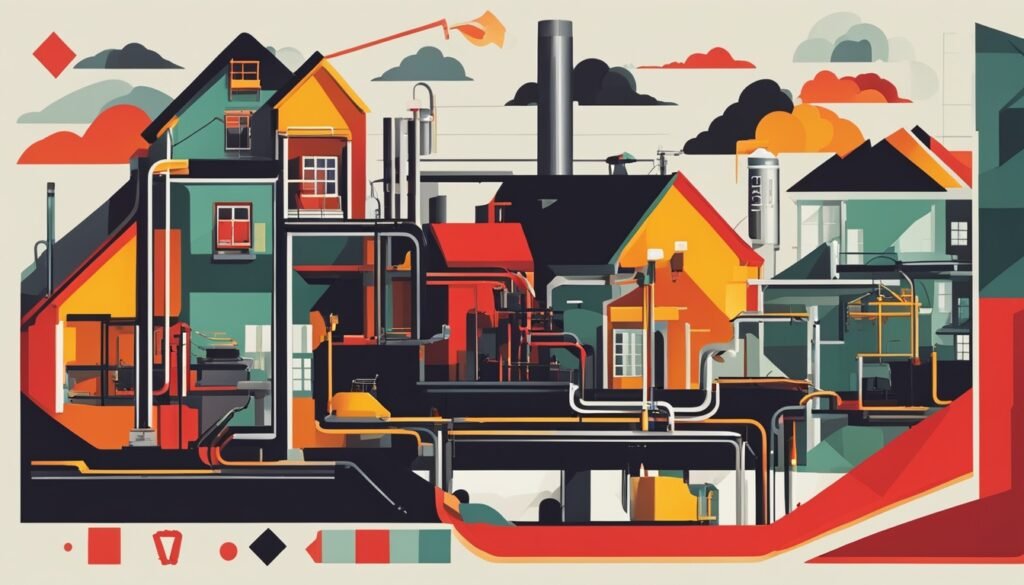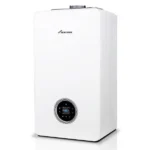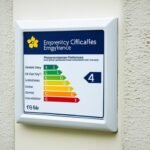If you’re a landlord in the UK, you’re responsible for your tenants’ safety concerning gas. This means you must ensure they have an annual gas safety check. You should also upkeep the gas systems and appliances properly, as well as keeping good records. Not following these rules can lead to serious problems. We’ve put together this guide to make it easy for you to understand the UK landlords gas safety certificate requirements. This way, your rental places will meet all rules.
Key Responsibilities
- UK Landlords must have an annual gas safety check done on their rental properties.
- They must give their tenants a Landlord Gas Safety Record (LGSR), or CP12, within 28 days of the check.
- Keeping gas appliances and systems in good condition is the landlord’s job.
- Landlords need to keep records, like the LGSR, for two years as proof they’re sticking to the rules.
- Not following the gas safety requirements can lead to big fines or even going to prison.
Introduction to Landlord Gas Safety Obligations
In the UK, landlords have a legal duty to make sure their rental properties are gas safe. The Gas Safety Regulations of 1998 set out what they need to do. This involves doing annual gas safety checks, keeping gas appliances and pipework safe, and giving tenants the right documents.
Legal Responsibilities for Landlords
The rules about gas safety for landlords in the UK are clear. They must maintain all gas appliances, flues, and pipework in a safe state. This requires an annual gas safety check by a certified Gas Safe engineer.
Importance of Gas Safety in Rental Properties
Gas safety is vital for protecting tenants from dangers like gas leaks and carbon monoxide poisoning. If landlords ignore these legal duties, they could be fined or go to prison.
UK Landlords Gas Safety Certificate Requirements
If you’re a landlord in the UK, you must get a Landlord Gas Safety Record (LGSR). This is also called a CP12 certificate for every property you rent out. A Gas Safe registered engineer issues this after checking the gas appliances each year.
The LGSR needs to go to tenants within 28 days of the check. This rule applies when they move in too. Also, you must keep your LGSR copies for two years. This is to show you’re following the rules about uk landlords gas safety certificate requirements and landlord gas safety regulations.
Getting a yearly gas safety check from a Gas Safe engineer is key. They look at all the gas stuff in your property. This makes sure everything is safe and working well.
The most popular domestic gas boiler makes in the UK are Worcester Bosch, Vaillant, Ideal Boilers, Baxi, Vokèra, Ariston, Alpha, Glow-worm, Potterton, Viessmann, Ferroli, Main, Keston, Intergas, and Heatline.
| Requirement | Details |
|---|---|
| Landlord Gas Safety Record (LGSR) | Also known as a CP12 certificate, this document is issued by a Gas Safe registered engineer after the annual gas safety check. |
| Provision to Tenants | Landlords must provide a copy of the LGSR to their tenants within 28 days of the check being completed, or at the start of a new tenancy. |
| Record Keeping | Landlords are required to keep copies of the LGSR for at least two years, as proof of compliance with the gas safety regulations. |
Knowing and obeying these uk landlords gas safety certificate requirements is crucial. It keeps your tenants safe from gas dangers. Plus, it stops the heavy penalties for not following the rules.
Annual Gas Safety Checks
UK landlords must organize a yearly gas safety check for each rental property. A qualified Gas Safe registered engineer does this. They inspect every gas appliance, flue, and pipeline.
What is Included in the Check?
The Gas Safe engineer does a full check on the gas systems. They look for gas leaks, examine pipework, and check if appliances work safely. Afterwards, they give the landlord a Landlord Gas Safety Record (LGSR), known as a CP12. This paper shows the inspection’s findings.
Qualified Gas Safe Registered Engineers
Landlords should ensure only Gas Safe engineers carry out these checks. They hold the right qualifications to work on gas safely. Choosing a Gas Safe expert means landlords know their properties meet the law’s gas safety rules. It also protects tenants from gas risks.

| What’s Included in the Landlord Gas Safety Check? | Who Can Conduct the Inspection? |
|---|---|
|
Only Gas Safe registered engineers are legally qualified to perform the annual gas safety check in the UK. |
Maintaining Gas Appliances and Pipework
If you’re a landlord in the UK, you have more to do than just get a gas safety check once a year. You’re in charge of making sure gas appliances and pipework in your properties are well looked after. This means making sure all gas appliances get serviced often, just like the makers say. Plus, if there are any problems, like things not working right, these need to be fixed quickly.
Regular Servicing and Repairs
It’s key to regularly service gas appliances to keep them working well and safe. Landlords need to keep good records of all the services and fixes. This proves they follow the gas safety rules. Also, fixing any problems found during safety checks or reported by tenants fast is important. This helps to keep the gas appliances and pipework safe.
By taking care of gas appliances with regular services and repairs, landlords meet their legal duties. They also look out for their tenants and keep their properties safe from risks.
Record Keeping and Documentation
If you’re a landlord in the UK, it’s vital to keep detailed records of all things related to gas safety in your properties. This means making sure to keep a copy of the Landlord Gas Safety Record (LGSR), or CP12, for at least two years.
Landlord Gas Safety Record (LGSR)
The LGSR shows that a gas safety check was done by a Gas Safe engineer each year. It includes what was looked at during the check, like gas appliances and pipes, and if there are any problems that need fixing. Landlords have to keep these records to show they’re following the rules on gas safety.
Providing Records to Tenants
Making sure your landlord gas safety record is up-to-date is important. You must give your tenants a copy of the LGSR within 28 days of the check or at the start of their lease. Failing to do this can get you in trouble, leading to fines. This shows how critical it is to keep good records and share them with your tenants.
Tenant Responsibilities and Information
UK landlords hold the main duty for gas safety in rentals, but tenants are crucial too. They must know about gas safety, including where the gas shut-off valve is and what to do in a gas emergency.
Informing Tenants about Gas Safety
Tenants need to understand their roles in gas safety, like telling the landlord if there are gas issues. This cooperation keeps the home safe, meeting the tenant responsibilities gas safety standard.
Landlords must make sure tenants know about gas safety. They explain everyone’s part in keeping gas safety high. This talk and teamwork between landlords and tenants are the key to top-notch gas safety in rented homes in the UK.
Penalties and Consequences of Non-Compliance
If landlords in the UK ignore the gas safety regulations, they can get into big trouble. This includes not getting an annual gas safety check or keeping up gas appliances and pipework. They also must share important documents with their tenants. Those who don’t do this could get fines up to £20,000 or go to jail for as long as two years.
The gas safety regulations in the UK are looked after by the Health and Safety Executive (HSE). They keep an eye on landlords who don’t follow the rules. If a landlord’s actions risk their tenants’ safety, HSE could take them to court. The punishment might be a big fine or even going to jail.
| Offence | Potential Penalty |
|---|---|
| Failure to arrange annual gas safety check | Up to £6,000 fine |
| Failure to maintain gas appliances and pipework | Up to £20,000 fine |
| Failure to provide gas safety documentation to tenants | Up to £5,000 fine |
| Serious gas safety breaches | Up to 2 years imprisonment |
Make gas safety a top priority if you’re a landlord. Understand what you need to do. Keeping rental properties safe can avoid these big penalties and consequences. This protects both your tenants and your business from getting into trouble.

Carbon Monoxide Detectors and Alarms
In the UK, landlords must install carbon monoxide (CO) alarms in their rental homes. This rule started in October 2022. A CO alarm is required in every room with a gas appliance except for cooking rooms. The goal is to keep renters safe from carbon monoxide danger.
Legal Requirements for CO Alarms
The law on carbon monoxide detectors is clear in the Smoke and Carbon Monoxide Alarm (England) Regulations 2015. It says that if you rent a place in England, it has to have a working CO alarm where there’s a gas, wood, coal, or oil appliance. Landlords who don’t follow these rules might get into trouble.
Installation and Maintenance of CO Alarms
Landlords’ duties include making sure CO alarms are fit and working well. They must choose the right alarms, put them in the right places, and check them often. Not doing these things could mean landlords face serious consequences if their tenants’ safety is endangered.
Gas Safety Resources for Landlords
There’s a lot of info out there to help landlords meet the UK’s gas safety resources landlords needs. The Health and Safety Executive (HSE) gives details on the Gas Safety (Installation and Use) Regulations from 1998. They also offer tips on how to follow the laws and be a top-notch landlord.
Government Guidance and Regulations
The HSE website breaks down the government guidance regulations gas safety for landlords. It explains legal duties, how to keep records, and what happens if they don’t stick to the rules. This place is great for making sure they do everything right.
Gas Safe Register and Gas Safety Advice
The gas safe register gas safety advice provides more help for landlords. As the main gas registration group in the UK, they offer ways to locate Gas Safe engineers near you. They also share tips on the best ways to manage gas safety in your properties. It’s key for landlords to use this advice to protect their tenants.
Landlords should check the HSE and Gas Safe Register sites often. They can keep current with laws and advice on gas safety resources landlords. This approach helps them meet their legal duties and keep their properties safe.
Conclusion
In the UK, landlords must ensure their rental homes are safe from gas dangers. They need to check the gas safety each year, take care of gas devices and pipes, keep detailed records, and give tenants vital info. If they don’t follow these rules, they could face big fines or even go to jail.
Knowing and fulfilling gas safety duties helps landlords keep their tenants safe. They should keep up with new rules and get advice from places like the Health and Safety Executive (HSE) and Gas Safe Register. This is crucial for them to do their part in keeping rental homes safe.
Landlords who care about gas safety help their tenants and protect their business. Making sure gas safety is a main concern helps keep rental homes safe and following the law. This way, they avoid serious fines and keep their reputation intact.




